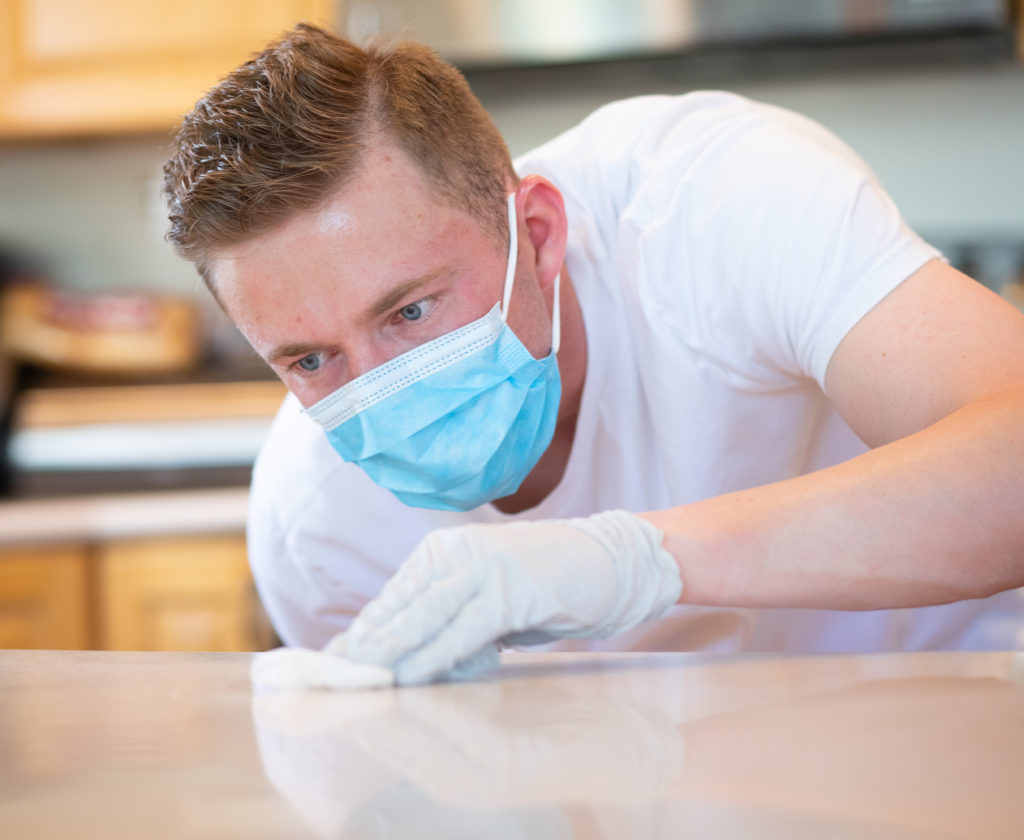
Avoiding germs is a healthy practice — but when does that avoidance become a disorder?
The spread of germs is at the forefront of people’s minds. More people are wearing face masks, sanitizing surfaces and taking other precautionary measures to prevent contamination. For someone with germophobic tendencies, avoiding germs is more than just a precautionary measure: it’s an obsession.
What is germophobia ?
Germophobia, also known as mysophobia, is described as a pathological fear of germs, bacteria, microbes, contamination and infection.
“People living with germophobia may experience stress and exhibit a hypervigilant stance towards their surroundings,” said Annabella Hagen, the clinical director for Mindset Family Therapy in Provo.
The anxiety can cause restlessness, fatigue, shortness of breath, headaches, digestion problems and other physical symptoms that can affect quality of life.
“Their relationships can also be negatively affected as they may neglect doing things with loved ones because of their fears,” Hagen said. “They may be too busy cleaning, obsessing and avoiding possible harm.”
Sydney Springer, a BYU junior from Laie, Hawaii, said germophobia is something she’s always struggled with.
“People offering me food directly with their hands freaked me out. Potlucks and luaus stress me out because you have no idea what’s been in or near the food,” Springer said.
During the flu season of 2017 and 2018, Springer said she was so anxious about getting sick that she quarantined herself in her room and only ate food she prepared herself.
“I was basically acting how people act now. So maybe I’m freaking out less because everyone is doing what I do normally when scary illnesses go around,” she said.
Springer goes to therapy and takes medication to help her cope with germophobia. Teletherapy has been a helpful resource given the current circumstances, and it is something she hopes to continue using during flu seasons in the future.
“Talking it out helps me from spiraling about getting sick. I probably rely on that tool the most,” Springer said.
While Springer has been able to cope well with the pandemic, there are others who have experienced an increased sense of fear and anxiety.
Mindset Family Therapy reported that 40% of its intake calls have been related to anxiety due to COVID-19. While the pandemic itself cannot cause people to have obsessive compulsive disorder (OCD), those who have a genetic predisposition for the disease face the possibility of having their fears reinforced.
According to Hagen, most of the clients who come to the clinic also struggle with scrupulosity (religious or moral OCD). Due to feelings of hyper-responsibility, they may obsess about having the virus and the possibility of contaminating family, friends and others.
“They don’t worry about themselves; their main fear is spreading the illness and causing someone else to become ill or die,” Hagan said. “Though they didn’t have OCD targeting contamination fears, they do now, and we’ve had to help them work through those fears as well.”
Understanding OCD
There seems to be an increased awareness of germophobia and OCD. However, Hagen warns of some misunderstandings surrounding OCD. Someone who is a germophobe may believe they have OCD, but that isn’t always the case.
“Those being challenged by germophobia focus on cleaning to prevent or reduce the possibility of becoming infected by germs, viruses and other substances. Because that’s their focus, they may think they have OCD, but they probably do not.”
Hagen said a common phrase she hears is, “Being a little OCD,” where the letters “OCD” are used as an adjective.
“It’s done innocently, but society needs to understand that OCD is a serious and debilitating illness for many people,” Hagen said. “Their daily distress affects their functioning and quality of life. There is nothing ‘little’ about struggling with this illness.”
Hagen said someone who is challenged by OCD will constantly obsess about becoming contaminated and will perform different types of rituals besides washing, cleaning and sanitizing to find relief from their everyday battle with anxiety or guilt.
Treatment methods for germophobia
The standard for treating phobias and OCD is Exposure and Response Prevention (ERP), a treatment designed to expose patients to their fears and help them develop the skills to avoid compulsive, ritualistic behaviors.
Dr. Forrest Talley has worked as a clinical psychologist for over 30 years. He too has seen the effectiveness of ERP treatments with his patients. Talley said the pandemic can be a “perfect opportunity to start one’s journey to be free from this crippling fear.”
“Just like any fear, the key is to behave in ways that are the very opposite of how the fear would have you act. If the urge is to disinfect a countertop that was just wiped clean an hour ago, resist the urge to repeat that process,” Talley said. “Better yet, intentionally place your hand on the countertop and then go about your normal business.”
Talley also recommends people find activities like reading a book, gardening, working out, talking to a friend or anything else that helps shift the focus away from performing rituals.
Katie Lear, a licensed clinical mental health counselor, said the guidelines from the CDC and other major health organizations on preventing the spread of COVID-19 have the potential to be a trigger for people with OCD. Lear recommends that clients follow the CDC’s guidelines for handwashing and other hygiene protocols but also be mindful that these regulations aren’t feeding into OCD rituals.
“If the CDC says to wash your hands for 20 seconds before eating or when coming back from the grocery store, go ahead and do it.” Lear said. “But don’t let yourself wash for 45 seconds, or start going through the whole hand washing procedure every 10 minutes while sitting at home.”
Hagen recommends keeping a gratitude journal to help individuals become mindful of what is going on internally and externally. She said it can also help them “become more grateful for the small and simple things that bring them joy despite the challenges they are currently facing.”




